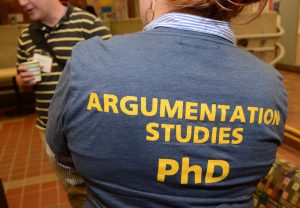The University of Windsor is admitting its first class for an interdisciplinary doctoral program in Fall 2017 that focuses on Argumentation Studies. Students and faculty come to the field from such different fields as law; human resources; the social, life, and computational sciences; communications; rhetoric (typically in English departments); and philosophy.
The interdisciplinary PhD in Argumentation Studies will be the first Windsor PhD program to involve humanities scholarship. Also, while there are many interdisciplinary PhD programs with a humanities focus at other places in Ontario and across Canada, none of them offer a particular scholarly specialization like this one; and it would be hard to find any interdisciplinary PhD anywhere in the world that has the sort of pedigree that the University of Windsor offers in the field of argumentation. Windsor is already known around the world for argumentation studies.
Argumentation theory emerged as a field in the late 1970s to early 1980s, drawing together three different streams of scholarship: a model for resolving verbal disagreements known as “pragma-dialectics” developed at the University of Amsterdam in the School of Speech Communication; scholarship in rhetoric connected with the practice of collegiate debate in the US; and at the University of Windsor, research in the philosophy and logic of argument, originally motivated to improve the way reasoning is taught to undergraduate students. The Windsor movement came to be known as “informal logic” and gave rise to the journal of the same name. These days “informal logic” often generally describes philosophical approaches to argumentation, and Windsor remains the strongest place in the world for it.
So just what do we count as argumentation? Here’s our definition: Principles and methods through which people reason collaboratively or competitively:
– On any topic where information, knowledge, or claims conflict or are inconsistent
– By which reasoners strive to persuade others through verbal or visual means
What does this mean for doctoral students in interdisciplinary Argumentation Studies? They are expected to have some past training in a related discipline or professional field – human resources may count among this too as conflict resolution is so important to that field. The student will build on their own previous background (minimum Master’s degree or equivalent; an LlB counts as an undergraduate degree) and employ it in ways that engage argumentation studies and the literature specific to that field. To be admitted students must also have a well-developed thesis research proposal – we recommend applicants correspond well in advance with our faculty.
Students will specialize in some particular disciplinary or professional approach. However, completing the program will enable students to analyze and evaluate arguments and argumentation from a variety of disciplinary and theoretical perspectives. They will find employment in education, human resources, and public policy.




